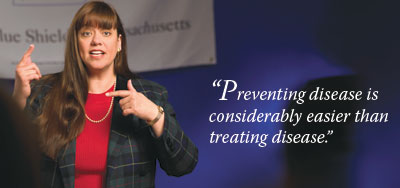
"No one, not even your doctor has the power you do to affect your own health," Pam Santin tells a group of workers at a Massachusetts technology company. "Take control of your health. Become a smart consumer of health care services. Recognize that the most important force in your overall health is you."
Pam is a health educator whose job is to educate our members so they become better health care consumers. Pam goes out to a wide variety of companies and speaks to thousands of workers each year.
"My goal is to help people not only improve their health but to help them save money in the process," says Pam.
Pam works to help members figure out when to go to the doctor, when to visit the emergency room, how to make their visits to their doctors more productive and satisfying. Her education helps members avoid needless trips to the emergency room and reduces unnecessary health care use.
"Take responsibility for your own health," she urges. "It's not about waiting until you get sick. It's about taking affirmative steps to prevent disease. To keep you healthy and well. And you can do it!"
Pam's style is lively, energetic--and direct. She tells an audience of our members: "The three leading causes of death--heart disease, cancer, stroke--are directly linked to lifestyle choices such as smoking, being overweight, lack of exercise, stress, diet, and alcohol. The more you know about risks to your health the more empowered you are to make good decisions.
"And positive lifestyle choices can have an enormous impact on your health and quality of life. A healthy diet and regular exercise can make a dramatic difference. Getting enough sleep can make a difference. Managing stress in a healthy way is critical.
"And for those of you who smoke--the number one cause of premature death--do yourself a favor, do your family a favor and quit. Is it easy? No. Can you do it? Absolutely! And it's the most important health decision you will ever make."
"Fifty percent of all premature deaths are directly related to lifestyle choices," she tells audiences. "Making good choices can improve the quality and length of your life."
"Making a few lifestyle adjustments can help prevent heart disease, stroke, Type II diabetes, colon cancer, and obesity. Just adding moderate physical activity to your life--taking a nice, brisk walk four or five days a week, for example--can have a profound impact on preventing disease (not to mention increasing your energy level and making you feel great!).
Pam's work has shown tangible evidence that when members are better informed consumers of health care, they are better able to control the cost of care.
"I was never an exercise person but my wife started walking with me and after a while I found myself walking a couple of miles at a whack. I've lost some weight, I sleep well, I feel better. This has enhanced my life tremendously."
Nothing could be more gratifying to Laura. "Preventive care is huge for me," she says. "I see it as the way to approach health care right now. The satisfaction is in seeing someone like make the changes and seeing him in control of his health--that's fantastic."
"Know what your benefits are," Pam tells members. "Understand your pharmacy plan and drug co-payment tier. Choosing generic drugs and using the mail order pharmacy can have a huge impact on the cost.
"Time with your doctor is precious--and expensive. Use it well by writing down everything you want to cover during the visit. If you do that you'll find the visits much more productive and you won't be driving home thinking, 'gee, I forgot to ask about x, y, or z issue.'"
"You can never be too involved in your care and good health care providers welcome your involvement. Question, probe, get information. Know where to go for accurate and reliable information--web sites such as the Centers for Disease Control and Prevention, the National Institutes of Health and the American Cancer Society. Understanding what services you need, how to access those services, and the true cost of medical services are all ways you can Play an active role in your care."






